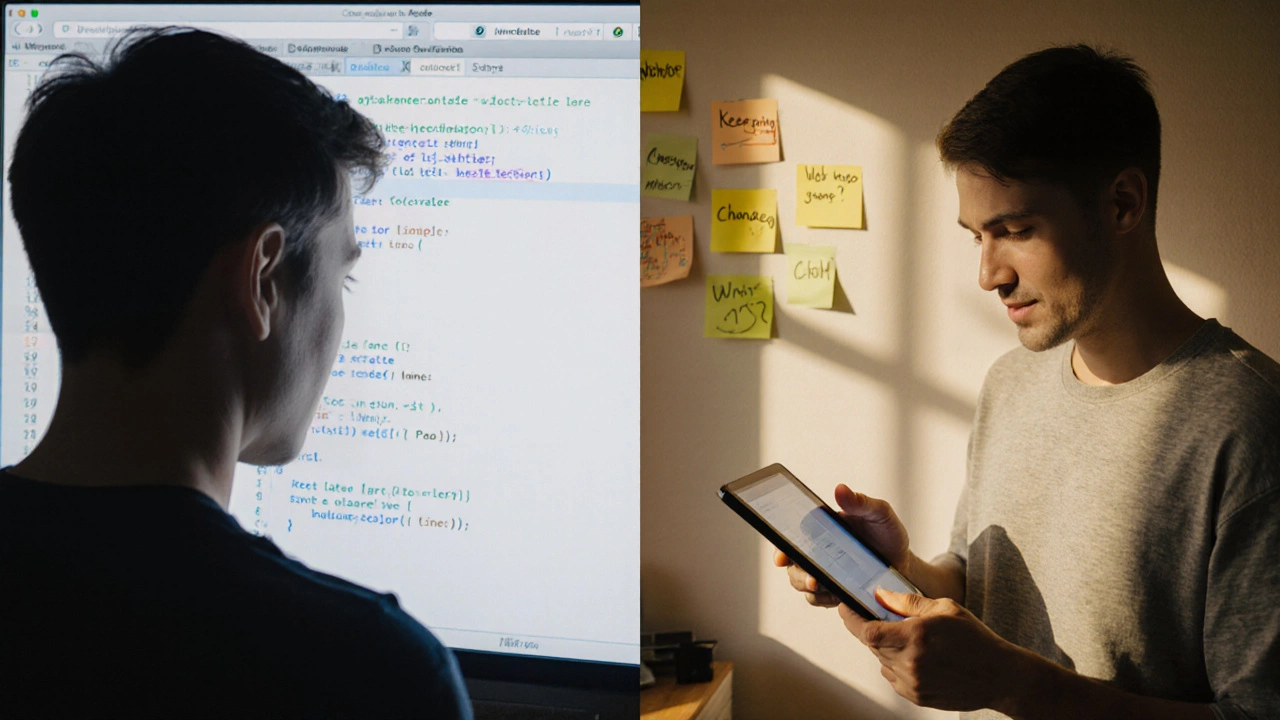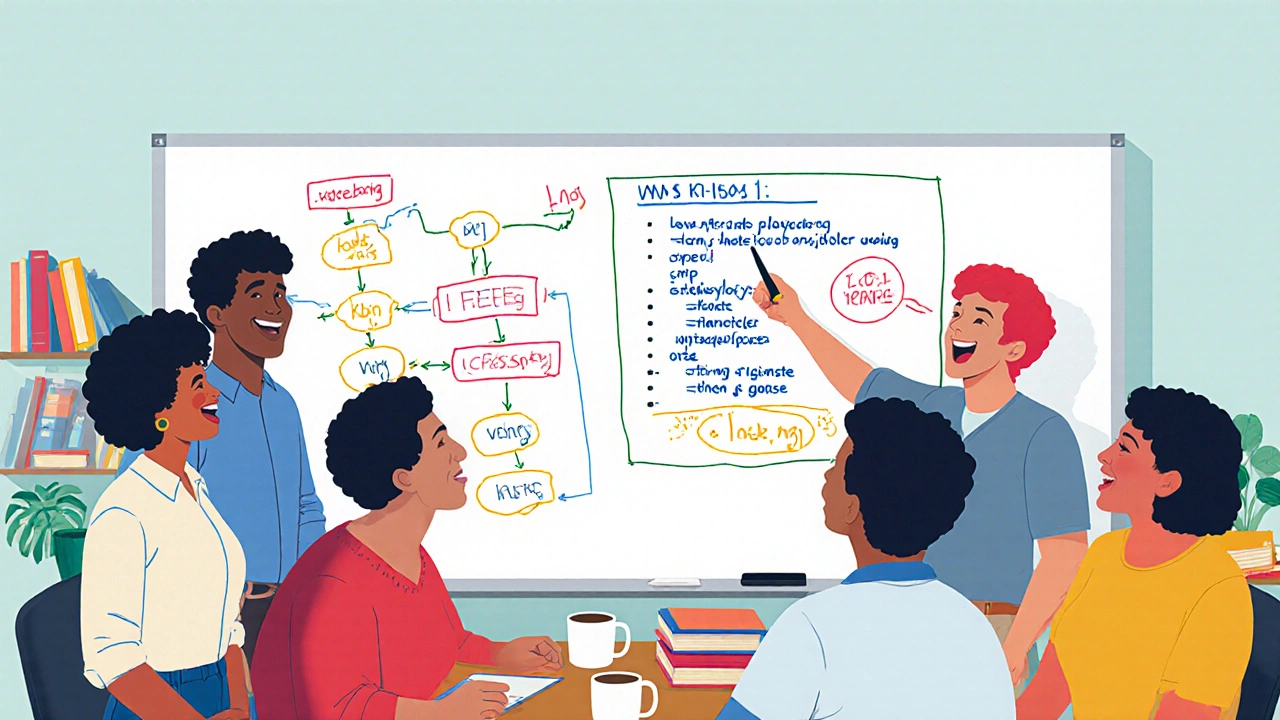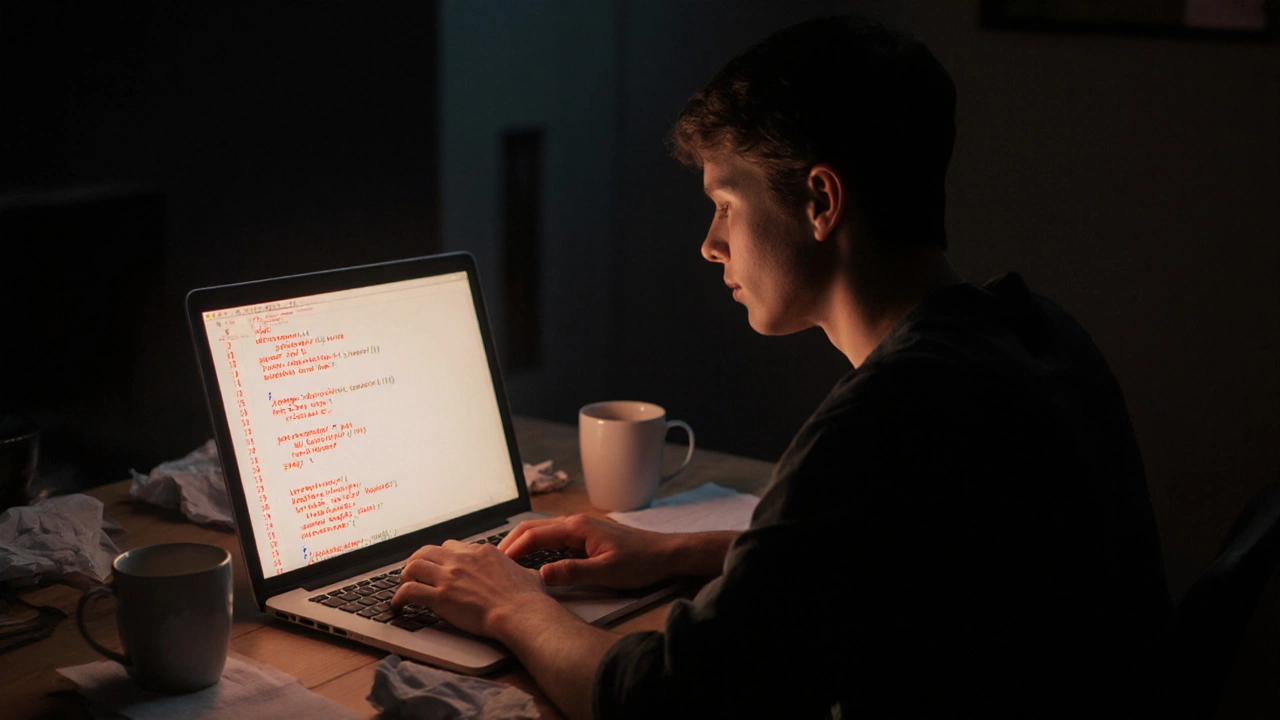People say coding is hard. But what does that even mean? Are you struggling to write your first line of Python? Do you feel like everyone else gets it except you? You’re not alone. And the truth? Coding isn’t hard because it’s magical. It’s hard because most people expect it to be easy.
What makes coding feel impossible
When you start coding, you’re not just learning a language-you’re learning to think differently. You’re training your brain to break problems into tiny pieces, spot patterns, and follow logic that doesn’t bend for feelings. That’s why so many people quit after the first week. They think coding is about memorizing commands. It’s not. It’s about solving puzzles with no instruction manual.
Take a beginner who signs up for a coding class expecting to build a website in a weekend. They watch a tutorial. They type the code. It doesn’t work. A missing semicolon. A wrong bracket. They get a red error message and assume they’re just not cut out for this. But that error? That’s not failure. That’s feedback. Every coder, no matter how experienced, sees those red messages every day.
The real barrier isn’t intelligence. It’s patience. Most people give up before they get to the point where things start clicking. It’s like learning to ride a bike. The first ten falls feel like proof you’ll never do it. The eleventh? You’re wobbling. The fifteenth? You’re going down the street without thinking about it.
What coding actually looks like in real jobs
Think coding means sitting alone in a dark room typing lines of code nonstop? That’s a myth. In real jobs, most of your time isn’t writing new code. It’s reading code. Debugging code. Asking questions. Waiting for tests to run. Explaining your changes to a teammate. Fixing something someone else broke last week.
At a startup in Sydney, a junior developer spends 30% of their day writing code. The rest? In meetings, reviewing pull requests, fixing bugs from last month’s update, and reading documentation no one updated since 2022. The job isn’t about being a genius. It’s about being consistent. Showing up. Not giving up when the fix takes three hours and you’re no closer than when you started.
And here’s something no one tells you: most professional coders don’t memorize syntax. They Google everything. Even senior engineers. You don’t need to remember how to write a for-loop in JavaScript. You need to know when to use one, why it might break, and how to fix it when it does.
Is coding hard for beginners? Yes-but here’s why it’s worth it
Yes, coding is hard at first. But it’s not hard in the way math or physics is hard. It’s hard because it’s new. Your brain hasn’t built the pathways yet. But those pathways form fast-if you practice daily, even for 20 minutes.
Here’s what works: start small. Build a calculator. Make a to-do list that saves to your browser. Change the color of a button on a website. Those tiny wins add up. They teach you that mistakes are normal. That progress isn’t linear. That you can fix almost anything if you keep asking: What changed? What did I do differently?
People who stick with coding aren’t the smartest. They’re the ones who keep trying after the third error. Who ask for help without shame. Who celebrate when their code finally runs-even if it’s messy. That’s the secret.

What coding classes actually teach you (and what they don’t)
Coding classes are great-but only if you know what to expect. A good course won’t turn you into a developer in 8 weeks. It’ll teach you how to think like one. It’ll show you how to read error messages. How to use Google like a pro. How to break a big problem into five smaller ones.
But here’s what most classes skip: the emotional side. They don’t teach you how to deal with frustration. How to silence the voice saying, “I’m too old for this.” Or “Everyone else is ahead.” That’s on you. That’s the real course.
Look at the structure of a solid coding class: it starts with variables, then conditionals, then loops, then functions. That’s the technical path. But the real learning happens when you hit your first bug that takes 4 hours to fix. That’s when you learn persistence. That’s when you start to grow.
Who succeeds at coding? Not who you think
The best coders aren’t the ones who aced math in school. They’re the ones who fix their little brother’s laptop. The ones who spent hours figuring out how to get their playlist to shuffle properly on their phone. The ones who read every comment on a forum trying to understand why something didn’t work.
Success in coding isn’t about talent. It’s about curiosity. It’s about not being afraid to break things. It’s about being okay with not knowing. If you’re the kind of person who asks, “Why does this work?” instead of “Why am I bad at this?”-you’ve already got the mindset.
I’ve seen people in their 50s, with no tech background, land their first coding job after six months of consistent practice. I’ve seen teenagers with perfect grades struggle because they expected instant mastery. The difference? One group saw struggle as part of the process. The other saw it as proof they failed.

How to know if coding is right for you
Ask yourself these questions:
- Do you enjoy solving puzzles-even if you don’t get them right away?
- Can you sit with something that doesn’t work for 30 minutes without giving up?
- Do you like figuring out how things work behind the scenes?
- Are you okay with being wrong a lot while you learn?
If you answered yes to at least three, you’re already ahead of most people who quit.
You don’t need a degree. You don’t need to be a math wizard. You don’t need to be 20. You just need to show up every day-even if you only write five lines of code. That’s how it works.
What comes after the first few weeks
After the initial shock, something shifts. You stop seeing code as a foreign language. You start seeing it as a tool. You realize you can build things that solve real problems. A script that auto-saves your spreadsheets. A simple app that reminds your mom to take her pills. A webpage that shows local weather without ads.
That’s the magic. Not the job title. Not the salary. It’s the feeling of saying: “I made this.” And knowing you didn’t need anyone’s permission to do it.
Coding isn’t a hard job because it’s technical. It’s hard because it asks you to change how you think. And that’s the hardest part of any skill worth having.
But if you stick with it? You won’t just learn to code. You’ll learn how to learn. And that’s the one skill that never goes out of style.
Is coding really that hard for beginners?
Yes, at first. But not because you’re not smart enough. It’s hard because your brain hasn’t learned how to think like a coder yet. Most people quit before they reach the point where things start making sense. The key isn’t talent-it’s showing up every day, even when you’re stuck.
Do you need to be good at math to code?
No. Most everyday coding-building websites, apps, or automating tasks-requires basic arithmetic at most. You don’t need calculus or algebra. What you need is logic: the ability to follow steps, spot patterns, and break problems down. That’s not math. That’s problem-solving.
Can you learn to code without taking a class?
Absolutely. Many successful developers are self-taught. Free resources like freeCodeCamp, The Odin Project, and YouTube tutorials can get you far. But classes help because they give you structure, feedback, and community. If you’re someone who needs deadlines or someone to ask questions to, a class speeds things up.
How long does it take to get good at coding?
You can write your first working program in a few hours. You can land a junior job in 6-12 months with consistent practice. But “good”? That takes years. Real skill comes from making mistakes, fixing them, and doing it again. There’s no shortcut. But every line of code you write gets you closer.
Is coding a good career if I’m not a tech person?
Yes-especially if you’re not a tech person. The best coders aren’t always the ones who grew up with computers. They’re the ones who bring other skills: communication, patience, creativity, or even experience in fields like healthcare, design, or education. Coding is a tool. It’s powerful when you use it to solve problems you understand.
